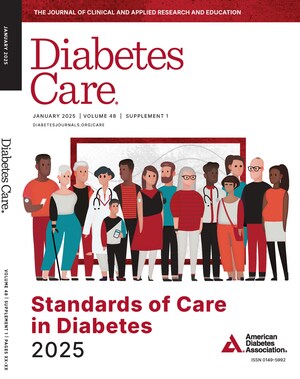ORLANDO, Fla., June 23, 2018 /PRNewswire-USNewswire/ -- New research finds that people with type 1 diabetes (T1D) who used the Diabeloop DBLG1 therapeutic, closed-loop insulin delivery system in a home setting experienced a greater percentage of time in the target blood glucose range and fewer hypoglycemic events compared to patients who used an open-loop system, consisting of their regular pump and sensor. The findings from the study, "Twelve-Week Home Use of Hybrid Closed-Loop Insulin Delivery System vs. Sensor-Assisted Pump Therapy in Adults with Type 1 Diabetes—Intermediate Results of the Multicenter Randomized Crossover Diabeloop WP7 Trial," were presented today at the American Diabetes Association's® (ADA's) 78th Scientific Sessions® at the Orange County Convention Center Convention Center.
The Diabeloop DBLG1 system is an advanced, closed-loop insulin delivery system with a complex, customizable algorithm that predicts future blood glucose levels and instructs insulin delivery by connecting three devices: a glucose sensor, a patch insulin pump and a smartphone-like terminal device hosting the algorithm. The continuous glucose sensor monitors the user's blood glucose level and sends data to the terminal, integrating the algorithm. The terminal controls the connected insulin pump by calculating and ordering the optimal amount of insulin. For maximum accuracy, users enter their food and physical activity information.
The goal of this new study, a follow-up to a 2016, three-day study, was to assess whether patients using the DBLG1 system could achieve better glucose control compared to sensor-assisted pump therapy in a home setting. The trial was conducted at 12 centers in France and enrolled 68 adults (average age 47.2 years) with T1D and an average HbA1c level of 7.6. The patients were randomly assigned to two groups, with 33 patients using the DBLG1 system, and 35 patients using their normal, open-loop system (i.e., their usual pump and sensor). The study was a crossover trial in which both groups of patients were evaluated using the DBLG1 system for 12 weeks. This study details the results of the first 12-week timeframe.
The results showed that the percentage of time spent in the target blood glucose range of 70-180 mg/dl was 69.3 percent for patients using the DBLG1 system compared to 56.6 percent for patients using an open-loop system. While the average glycemic level was lower for patients with the DBLG1 system compared to the one for patients with standard care, the lowered glucose level did not lead to more hypoglycemic events. The percentage of time spent in hypoglycemia (< 70 mg/dl) was about half the amount with the DBLG1 than with the usual, open-loop system (2 percent and 4.5 percent, respectively).
"The DBLG1 is a powerful and customizable algorithm system for type 1 diabetes treatment that may enable patients to significantly and durably reduce their glucose levels without an increase in hypoglycemic events," said lead study author Sylvia Franc, MD, research director and vice-president of CERITD—Centre of Study and Research on Intensification of Treatment of Diabetes—in France. "The results of our study confirm in real life, over a 12-week period, the positive results previously observed in an inpatient setting. This system has the potential to substantially improve the glycemic control and the quality of life for patients with type 1 diabetes, decrease long-term chronic diabetes complications, and reduce the burden of the dozens of daily calculations and therapeutic decisions they currently have to make themselves."
To speak with Dr. Franc, please contact the ADA Press Office on-site at the Orange County Convention Center on June 22 - 26, by phone at 407-685-4010 or by email at [email protected].
The American Diabetes Association's 78th Scientific Sessions, to be held June 22-26, 2018, at the Orange County Convention Center in Orlando, is the world's largest scientific meeting focused on diabetes research, prevention and care. During the five-day meeting, more than 16,000 health care professionals from around the world will have exclusive access to more than 3,000 original diabetes research presentations, participate in provocative and engaging exchanges with leading diabetes experts, and can earn Continuing Medical Education (CME) or Continuing Education (CE) credits for educational sessions. The program is grouped into eight theme areas: Acute and Chronic Complications; Behavioral Medicine, Clinical Nutrition, Education and Exercise; Clinical Diabetes/Therapeutics; Epidemiology/Genetics; Immunology/Transplantation; Insulin Action/Molecular Metabolism; Integrated Physiology/Obesity; and Islet Biology/Insulin Secretion. Felicia Hill-Briggs, PhD, ABPP, President of Health Care and Education, will deliver her address, "The American Diabetes Association in the Era of Health Care Transformation," on Saturday, June 23, and Jane E.B. Reusch, MD, President of Medicine and Science, will present her address, "24/7/365 – Lifetime with Diabetes," on Sunday, June 24. In total, the 2018 Scientific Sessions includes 375 oral presentations; 2,117 poster presentations, including 47 moderated poster discussions; and 297 published-only abstracts. Join the Scientific Sessions conversation on social media using #2018ADA.
About the American Diabetes Association
Nearly half of American adults have diabetes or prediabetes; more than 30 million adults and children have diabetes; and every 21 seconds, another individual is diagnosed with diabetes in the U.S. Founded in 1940, the American Diabetes Association (ADA) is the nation's leading voluntary health organization whose mission is to prevent and cure diabetes, and to improve the lives of all people affected by diabetes. The ADA drives discovery by funding research to treat, manage and prevent all types of diabetes, as well as to search for cures; raises voice to the urgency of the diabetes epidemic; and works to safeguard policies and programs that protect people with diabetes. In addition, the ADA supports people living with diabetes, those at risk of developing diabetes, and the health care professionals who serve them through information and programs that can improve health outcomes and quality of life. For more information, please call the ADA at 1-800-DIABETES (1-800-342-2383) or visit diabetes.org. Information from both of these sources is available in English and Spanish. Find us on Facebook (American Diabetes Association), Twitter (@AmDiabetesAssn) and Instagram (@AmDiabetesAssn).
| 247-OR |
Twelve-Week Home Use of Hybrid Closed-Loop Insulin Delivery System vs. Sensor- |
|
| Assisted Pump Therapy in Adults with Type 1 Diabetes—Intermediate Results of the |
||
| Multicenter Randomized Crossover Diabeloop WP7 Trial |
78th Scientific Sessions
News Briefing: Advances in Technology, Saturday, June 23, 11:30 a.m. ET
Session Title: Clinical Trials in Type 1 Diabetes
Session Type: Oral Presentations
Location: W308
Session Time: Sunday, June 24, 2018, 2:15 - 4:15 pm
SYLVIA FRANC, PIERRE Y. BENHAMOU, SOPHIE BOROT, LUCY CHAILLOUS, BRIGITTE DELEMER, BRUNO GUERCI, HÉLÈNE HANAIRE, NATHALIE M. JEANDIDIER, SR., ERIC RENARD, YVES REZNIK, PAULINE SCHAEPELYNCK, CHARLES THIVOLET, GUILLAUME CHARPENTIER, Corbeil-Essonnes, France, Grenoble, France, Besançon, France, Nantes, France, Reims, France, Vandœuvre-lès-Nancy, France, Toulouse, France, Strasbourg, France, Montpellier, France, Caen, France, Marseille, France, Lyon, France
Objective: Availability of closed-loop insulin delivery systems is expected by patients with type 1 diabetes. Our main objective was to assess whether patients using the Diabeloop artificial pancreas system could achieve a better glucose control compared to sensor-assisted pump therapy, as measured by percentage time in range 70-180 mg/dl.
Methods: A multicenter clinical trial was conducted in a home setting, using an MPC-based algorithm, a hybrid monohormonal system (CellNovo® pump and Dexcom G5® sensor) and centralized remote monitoring. Adult patients with T1D for ≥ 2 years, pump therapy for ≥ 6 months, HbA1c ≤ 10%, and preserved hypoglycemia awareness were included among 12 investigation centers. Design was a crossover trial with a 2-week run-in period, followed by 2 sequences of 12 weeks each separated with washout. Results of the first 12-week arm are reported.
Results: 68 patients (27 men, age 47.2±13.4 years, HbA1c 7.6±0.9%, duration of disease 27.9±13.2 years) were randomized between closed-loop (CL, n=33) and open-loop (OL, n=35) first. During the first 12-week period, time spent in the 70-180 mg/dl range was 69.5% [62.4;75.6] in CL vs. 58.7% [45.2;64.9] in OL. Time in hypoglycemia <70 mg/dl was 2.1% [1.2;2.6] in CL vs. 4.1% [1.9;6.1] in OL.
Conclusion: The Diabeloop closed-loop system was efficient regarding metabolic outcomes.
Author Disclosure Block: S. Franc: Consultant; Self; Animas Corporation, Johnson & Johnson Diabetes Institute, LLC., Roche Diabetes Care Health and Digital Solutions. P.Y. Benhamou: Advisory Panel; Self; Diabeloop S.A. Consultant; Self; Abbott, Novo Nordisk Inc., Sanofi. Other Relationship; Self; Eli Lilly and Company, Roche Diabetes Care Health and Digital Solutions. S. Borot: Consultant; Self; Abbott, Animas Corporation, Johnson & Johnson Diabetes Institute, LLC., Medtronic, Roche Diabetes Care Health and Digital Solutions. L. Chaillous: None. B. Delemer: Other Relationship; Self; Eli Lilly and Company, Sanofi-Aventis. B. Guerci: None. H. Hanaire: Consultant; Self; Abbott, Animas Corporation, Johnson & Johnson Diabetes Institute, LLC., Medtronic, Roche Diabetes Care Health and Digital Solutions. N.M. Jeandidier: Board Member; Self; Sanofi-Aventis. E. Renard: Advisory Panel; Self; Abbott. Board Member; Self; Eli Lilly and Company, Insulet Corporation, Novo Nordisk A/S, Roche Pharma, Sanofi. Consultant; Self; Air Liquide. Research Support; Self; Dexcom, Inc., Roche Pharma, TypeZero Technologies, Inc. Y. Reznik: None. P. Schaepelynck: Board Member; Self; Novo Nordisk A/S. Consultant; Self; Roche Diabetes Care Health and Digital Solutions. Speaker's Bureau; Self; Abbott, Eli Lilly and Company, Medtronic MiniMed, Inc., Sanofi-Aventis. C. Thivolet: Advisory Panel; Self; Abbott, Medtronic MiniMed, Inc., Sanofi-Aventis. G. Charpentier: Consultant; Self; Abbott, Dexcom, Inc., Medtronic.
Press Office in Orlando
June 22 - 26, 2018
407-685-4010
Contact:
Michelle Kirkwood
(703) 299-2053
[email protected]
SOURCE American Diabetes Association
Related Links
WANT YOUR COMPANY'S NEWS FEATURED ON PRNEWSWIRE.COM?
Newsrooms &
Influencers
Digital Media
Outlets
Journalists
Opted In






Share this article